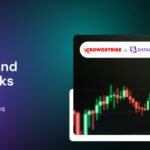Event marketing continues to evolve – what works today will be irrelevant tomorrow. Which tried and tested strategies can help you boost your ROI?
A typical B2B sales deal can take 4 – 8 months to reach its final stage. The recent shift towards hyper-personalization and customer-centricity has made the already complicated B2B sales cycles more competitive.
Recent studies also show a slight increase in marketing spending by organizations in the post-COVID era. Of these marketing spends, almost 6.5% of the budget is invested in events by the B2B marketing leaders.
From the data above, one thing seems clear – B2B events are a crucial marketing segment. Marketers and sales reps get to spend time with their prospects in a relaxed setting outside the traditional sales setting.
B2B event marketing has many benefits – from connecting better with your prospects to having higher chances of conversion due to the personal touch missing from the sales calls. Let’s find out how can B2B event marketing help organizations increase ROI.
Importance of B2B Event Marketing
B2B event marketing helps you hit three birds with a stone. You can:
- Drives brand awareness
- Educate stakeholders about your product and services
- Boost your business growth
Here are some more reasons to help you understand the importance of B2B events:
Networking: The most obvious benefit of B2B events is networking with like-minded peers like potential clients, partners, or industry leaders.
Lead Generation: Events can help generate leads and propel sales by positioning businesses instantly in front of their target customers.
Brand Awareness: Participating in or hosting B2B events is a great way to spread awareness about your business. You can tell people what you sell, your brand story, and your vision and mission.
Education: Events offer a chance to familiarize your target audience with specific products or services, industry advancements, and best practices.
Customer Engagement: They provide a forum for businesses to engage with existing clients, compile valuable feedback, and acquire insights.
Best Practices for Maximizing Your ROI from B2B Event Marketing

1. Understand Your Target Audience
Understanding your audience is the first step in any B2B practice. You must think about what your target audience would prefer. Are they more likely to prefer online events or in-person events? Do they prefer large-scale gatherings or more intimate meetings? Research their products/services, and plan things keeping them in your mind. Once you have a clear understanding of this, you can move ahead.
2. Setting Clear Goals and Objectives
Another basic yet crucial step is setting clear goals and objectives for your B2B marketing strategy. Asking these questions to yourself can make your job easier:
- What are your aspirations for these events?
- Do you want more leads, or do you want to increase awareness about your brand or establish thought leadership in your industry?
Once you know what outcome you expect, you can work towards your event platform strategy to achieve those objectives.
3. Creating a Compelling Event Page
Event platforms are vital for B2B marketing success, and one of the key factors in this case that it is imperative to mention is designing an engaging event page. Thus, the page combination should contain all basic information about the event in terms of date, time, location, and agenda, as well as the position of the given event as the attending opportunity. What is in it for them to be coming to your event? Will they get to mingle with business representatives, explore more about novelties and advancements in the sphere, or listen to appealing speeches? The inclusion of the above information crisply and prominently will assist in bringing in more audiences or registrants.
4. Using Social Media to Promote Your Event
Social networks are one of the best platforms for spreading information about any event and attracting the attention of the general public. To get the most out of your advertising, develop a social media plan that calls for constant posting in the run-up to the event. Also, include appropriate hashtags that are popular in your niche, and include industry influencers and organizations in the post.
Apart from this, you could also use a specific hashtag that would be connected with the event and carry out a small contest or give away something to share the event with friends. During the event, you should also urge the attendees to post their experiences on their social media accounts, preferably with the event hashtag. It will increase engagement, trigger the curiosity of people about the event, and allow you to reuse content in future promotions.
5. Utilize Interactive Features and Tools
You should provide them with moments to remember you. It could be from open debates, and Q&A sessions, to lively polls and open voting, or any other breakaway section using the breakout rooms option. There are many ways in which an event platform can allow the building of interactive functionality and features for particular events to make them engaging and, therefore, memorable. For example, you can add stage polls, questions, and answers or even break out sessions to the event schedule. In this way, you ensure that you offer the attendees something that they are to interact with the attendees and your brand and share with others, giving you better coverage.
6. Following Up with Attendees and Measuring Your Success
Post your event, communication should not stop. You need to continue engaging your audience and get feedback. Ideally, it is beneficial to supply the attendees with an e-mail saying thank you and possibly ask some questions or consider providing a coupon for a future event for special offers. It can promote goodwill and sustain interest amongst the target attendees towards the brands frequented by them. Moreover, evaluate your effectiveness in similar terms, namely, attendance, social activity, and leads obtained. The following information will help you to adjust your tactics for the subsequent projects and increase the ROI.
Conclusion
In short, event platforms are like supercharged meeting places for businesses to connect with future customers. By planning your event with clear goals, making it entertaining online, and using cool features to keep people engaged, you can totally ace it. You need to track how well your event does and keep trying new things to make your next event even better.





